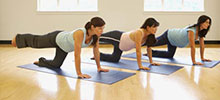Pregnancy Fitness
If you are reading this during the early stages of your pregnancy then the chances are that you are feeling exhausted, possibly nauseous and emotionally a little overwhelmed. You might be surprised to hear then, that now is not the time to spend every available moment curled up under a duvet (although rest is important too). It's time to get up and get that heart pumping!
What Sort of Exercise?
Find out what sort of exercise might suit you during your pregnancy and what sports your should avoid. Exercising Safely

Make sure you save yourself any harm during exercise by reading our guide on how to exercise safely. Walking

Find out how to stay fit during your pregnancy with walking and get some ideas on how to get started. Yoga

Find out how to stay fit during your pregnancy with yoga and get some ideas on how to get started. |
Warming Up and Down

Learn how to warm up and cool down properly to help prevent injury. Using a Birthing Ball
Get some helpful ideas on how you can use your birthing ball to stay fit during your pregnancy. Pilates

Find out how to stay fit during your pregnancy with Pilates and get some ideas on how to get started. Swimming

Find out how to stay fit during your pregnancy with swimming and get some ideas on how to get started. |
Why is exercise during pregnancy good for women?
Firstly, it can help you to cope with your tiredness. It has long been accepted that too much rest can actually make you more tired and lethargic, and pregnancy fatigue is no exception. Don't overlook the importance of rest; it is very important that you get a good night's sleep and take daytime naps if you need them. However, if you also combine this with a regular exercise routine you will probably find that you have more energy and that the quality of your sleep or rest improves as well.
Health-wise, it is thought that regular exercise during pregnancy can help to ward off gestational diabetes. It will also help to keep your muscles strong, which in turn will support your ever growing body and help to prevent back pain. Your raised heart rate will help you to increase your blood circulation and might ease swelling in your ankles and feet, a common discomfort of pregnancy. Better circulation can also help to reduce your chances of varicose veins. Exercise, even a small amount, can also help to keep your bowels working and avoid constipation.
Exercise will also help you to feel more comfortable if you are suffering from cramp - particularly in your legs. Stretching should be included as part of your exercise routine and this will help to soothe and relax your aching muscles.
If you are feeling a bit low, worried or anxious about becoming a mum then get out for a brisk walk. Exercise is known to improve your mood, pregnant or otherwise. This is because during exercise your brain releases endorphins - the 'feel good' chemicals that give your outlook a bit of a boost. Very often people find that it is during exercise that they manage to get their thoughts straight too. By the time you are home you will probably be feeling a lot better.
When the big day finally comes around, you will benefit from having implemented a regular exercise routine. Staying fit increases your stamina, and the more stamina you have, the better you will cope with labour. Having exercised through your pregnancy isn't a guarantee that you will have a quick and easy delivery, but it will increase your chances of one. It will also reduce the likelihood of you needing a caesarean section or other forms of intervention such as a forceps assisted delivery.
After you have had the baby, you will find coping with your new life a lot easier if you recover quickly from the birth. If you have a good level of fitness you will find recovery from either a natural delivery or a caesarean section easier. Including pelvic floor exercises, or kegels, in your routine will also benefit your post-partum recovery. You will find that your body returns to its pre-pregnancy shape more quickly if you have avoided being a couch potato for the preceding nine months.
Is exercising safe during pregnancy?
Yes, in most cases a regular exercise routine is encouraged during pregnancy. Obviously, if you have any pregnancy complications then your advised exercise regime may be different to that of most pregnant women. For this reason, always talk to your GP at the start of your pregnancy about continuing your current exercise program or starting anything new. They will be able to advise you as to what is most suitable and how to take a sensible approach.
While exercise is good for your pregnancy, it is important that you recognise when you are pushing yourself too far. You should not exercise to the point of fatigue. Feeling a little out of breath is normal during exercise but panting, or struggling for breath is a sign that you have done too much. Always ensure that you do not get overheated; wear appropriate clothing and avoid exercising in the heat. Before, during and after exercise you must make sure that you drink plenty of water as dehydration can be dangerous during pregnancy. It is also important that your body is well fuelled before you do any exercise. Don't set off for a run straight after a big meal, but make sure that you have a high-energy snack before you set off. Having another snack after your workout will replace some of the lost calories and help to maintain your energy levels.
Making sure that you warm up and cool down properly is even more important during pregnancy. Ensure that you know how to warm up your muscles and build up your heart rate gradually during your workout, and make sure that you carry out stretches safely.
Obviously, you should avoid any sport which involves a risk of falling or being hit by something (contact sports, squash etc) as this could pose a direct risk to your baby. Remember, too, that your balance will become less and less reliable as time goes on, so keep this in mind when planning your routine.
Is exercise during pregnancy good for the baby?
Yes, exercise is very good for the health of your baby. The increased heart rate and oxygen levels, together with the sounds and vibrations that they experience are all thought to help stimulate them. Babies born to mums who exercise through pregnancy are more likely to fall under the category of 'easy newborn' insofar as they are more likely to sleep through the night sooner, they are less likely to have colic and they are usually better able to soothe themselves.
You might be surprised to hear that exercising could also help your little one to be top of the class at school! Research indicates that children perform better in language and motor tests at the age of 5 if their mothers exercised during pregnancy.
How much exercise should I do?
The official advice for pregnant women (with uncomplicated pregnancies) is to exercise for 30-60 minutes, 3 to 4 days a week if possible. We're not talking about doing an all-out sprint each time, the advice is to take on light to moderate exercise. Obviously this will depend on your exercise regime and fitness level prior to pregnancy. If you are already very fit then you will be capable of doing more exercise than somebody who is just starting an exercise routine now that they are pregnant. Listen to your body and talk to your GP to make sure that you are exercising safely.